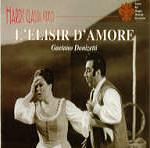This black-and-white, wonderfully old-fashioned film of a live performance of L’elisir d’amore, complete with faded painted backdrops and no attempt to update or “make relevant” this delicious work, is, well, delicious–gorgeously sung and charmingly acted. The pedigree is impeccable. I can’t recall a recent performance of an Italian opera with all-Italian forces, including conductor, and at the risk of sounding chauvinistically Italian, there really is something elegant and natural about an entire cast steeped in the language, rhythms, and idiom that keeps the Italian-opera tradition alive.
And besides that, the principals–all expert in their roles–were in their primes here. Renata Scotto had only recently begun singing the heavier parts that eventually would make her sound unstable and shrill, and her Adina is just perfect. Her tone, except for an acidy high note or two, is lovely and round, and her portrayal–at first just too sassy and sure of herself, and later, meltingingly in love and honest with Nemorino–is right on the money. She was pudgy and pretty in 1967 (or ’68–the notes inside conflict with what’s on the box), and she looks like a girl from a little village. Who would be as convincing today?
Tenor Carlo Bergonzi was known for his musicianship, taste, classy phrasing, and handsome tone, and all of those traits are in evidence. His “Una furtiva lagrima” gets a gigantic ovation, which the tenor acknowledges with a slight bow, a custom now frowned on. Bergonzi was known as a graceless, unimaginative actor, but here, playing a loveable dolt, he’s endearing and believable, and the fact that he hardly cuts a romantic figure only adds to the charm. Giuseppe Taddei was one of the great, big-voiced baritones of his generation (he gained fame beginning in the late-’40s), and he’s oddly cast here as the suave army sergeant Belcore. He was a consummate actor and so we expect him to impress dramatically, but he also manages his way around Donizetti’s fast music in a manner rarely heard from a singer who was known for his Scarpia and Iago, among others. Bass Carlo Cava is a fine quack doctor Dulcamara; he sings fluently and doesn’t mug nearly as much as many others in this role.
The chorus moves in big bunches, and when the camera pans them they look a bit bored, but they know and sing the music well. The orchestra plays very well under Maestro Gavazzeni, who opts not to rush things, bringing out the melancholy in Nemorino’s music, which is just right for Bergonzi’s biggish sound and also allows for other vocal niceties here and there. The sound is good (Dolby Digital), the picture is clean and clear (4.3) for a 40-year-old film, and there are subtitles in English, French, Italian, and Spanish. There are other L’elisirs available on video–some very starry (Pavarotti; Alagna and Gheorghiu)–but there’s something so innocent and unpretentious about this production that suits the opera so well that it’s a must-see. A real joy.
































